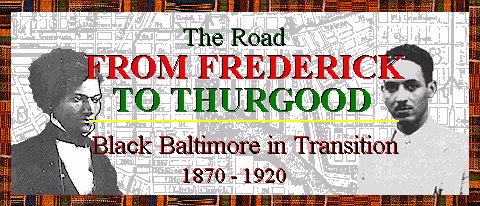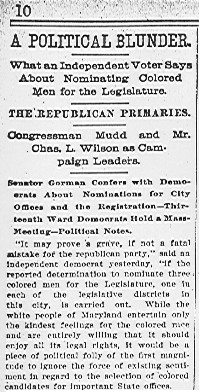 |
"I Am For Justice":The Campaign of 1897, Part 2 |
 |
"I Am For Justice":The Campaign of 1897, Part 2 |
 Within
a week of the backlash from white republicans
and independent democrats, the party leadership buckled and reneged
on its promise to blacks. It became known that Malster Republicans planned to
retract their offer to nominate a single black man to each of the legislative
districts (three total). As the Baltimore American reported, "not
even a sop was thrown to the colored contingent, whose cherished hopes
of having legislative representation were ruthlessly shattered." The
process which led to this sell-out featured, on the part of most black
leaders, impassioned calls for sanity amid high running emotions. At the
nominating convention for the First Legislative District, as it appeared
that John C. Green, a popular black candidate, would be voted down, Rev.
George Bragg, rector of St. James Protestant Episcopal Church, challenged
Green's detractors to see the correctness of his nomination at that point
in time. Not only would the number of blacks potentially bolting the Republican ranks
out poll any independent Democratic vote the party stood to gain, but
the defection could be permanent if the Democrats offered at least the
low-level considerations enjoyed under Republican allegiance. "I am
for justice, that is all," Bragg stated, "and that the party
of Lincoln means what it says when it declares that it knows no color distinction."
Within
a week of the backlash from white republicans
and independent democrats, the party leadership buckled and reneged
on its promise to blacks. It became known that Malster Republicans planned to
retract their offer to nominate a single black man to each of the legislative
districts (three total). As the Baltimore American reported, "not
even a sop was thrown to the colored contingent, whose cherished hopes
of having legislative representation were ruthlessly shattered." The
process which led to this sell-out featured, on the part of most black
leaders, impassioned calls for sanity amid high running emotions. At the
nominating convention for the First Legislative District, as it appeared
that John C. Green, a popular black candidate, would be voted down, Rev.
George Bragg, rector of St. James Protestant Episcopal Church, challenged
Green's detractors to see the correctness of his nomination at that point
in time. Not only would the number of blacks potentially bolting the Republican ranks
out poll any independent Democratic vote the party stood to gain, but
the defection could be permanent if the Democrats offered at least the
low-level considerations enjoyed under Republican allegiance. "I am
for justice, that is all," Bragg stated, "and that the party
of Lincoln means what it says when it declares that it knows no color distinction."
Reactions were also registered in the Second and Third Legislative Districts. In the Second, with councilmanic hopeful Harry S. Cummings as the most visible black republican, a less-than-vigorous effort to see Walker S. Lewis nominated was defeated by "anti-colored sentiment", according to the American. With their much talked-about effort defeated, the Cummings' contingent reaction was rather apathetic. No such self-restraint was demonstrated in the Third Legislative District -- "once or twice a free fight seemed imminent." Blacks from the twentieth ward, led by W. Ashbie Hawkins, registered with indignation the recanting of the seemingly well-known promise. "A solemn obligation has been willfully violated, and I see no reason why I should support the ticket," declared Hawkins, "Any other ticket is preferable to me."
Malster's men scrambled to save face, shift blame, and evade criticism for their double-take. Equally uneasy as the news of the decision not to nominate blacks spread were black Malsterites like Harry S. Cummings and Hiram T. Watty. When asked to name the specific white Republicans who spearheaded the anti-black nominee efforts, Watty, though he knew their names, refused to reveal them. Audaciously, Malster Republicans challenged rebuffed black leaders to put aside for the moment the fact that they once again were being taken for granted, and to do what was good for the party. "This has now become a question of reason and expediency", said Malsterite George R. Gaither, "rather than of pure equity and sentiment." Cummings (in an ultimately superficial gesture) and others however, threatened to work against the Republican ticket unless the original promise was reinstated. "When I go back to my people I shall tell them that we were beaten by your perfidy, and you may know what the consequences will be -- your ticket will be cut from top to bottom." The pulpits of the city's black churches, always a open to pro-republican propogandizing, "would work for the defeat of the republican ticket," promised Revs. Ernest Lyons and John Hurst.
For many, this was the last insult. Any hesitation on following through with the earlier promise to organize an independent ticket was set aside. Particularly among the intermediate level of the city's black leadership, organizing support for a local ticket headed by Attorney George M. Lane's mayoral candidacy began in earnest. Similar movements were begun in other parts of the state.
Copyright: Maryland State Archives, 1997